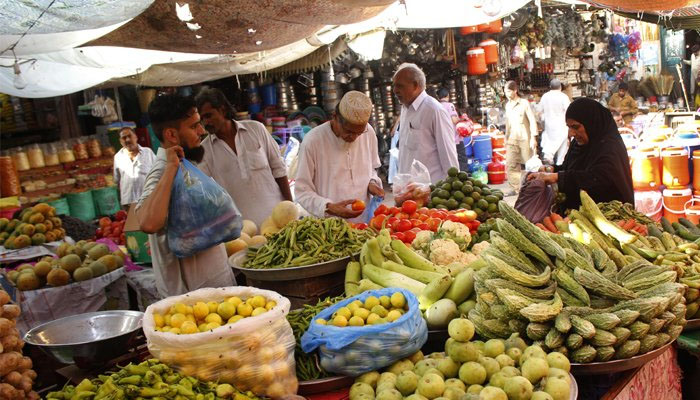SPI inflation hits record 45.5pc with perishables’ price surge
KARACHI: Flood-induced supply chain disruptions raised prices of perishables, making weekly inflation surge a record 45.5 percent on annualised basis with week-on-week number up 1.31 percent during the seven-day period ended September 1.
Pakistan Bureau of Statistics (PBS) data released on Friday attributed the YoY increase in SPI to the hike in prices of onions (42.17 percent), tomatoes (13.25 percent), pulse moong (7.94 percent), potatoes (6.97 percent), LPG (4.45 percent), eggs (3.84 percent), chicken (3.25 percent), pulse gram (2.89 percent), wheat flour (1.49 percent), pulse mash (1.26 percent), bread (1.22 percent), diesel (1.19 percent), and petrol (0.88 percent).
Fahad Rauf, head of research at Ismail Iqbal Securities, said the hike was mainly on account of onion prices. “Contrary to expectations, tomato prices have increase by mere 13 percent despite flood-related supply constraints. In Karachi, our market survey suggests that supply has improved due to availability of imported tomatoes.”
In his inflation forecast, Rauf added, “We expect inflationary pressures to continue due to impact of floods. However, immediate shock might be reduced if perishable food supply is managed through imports.”
Pakistan’s consumer price index (CPI) inflation hit a 47-year high at 27.3 percent in August 2022, the level last seen in May 1975, with full impact of massive flooding on prices of food and other commodities yet to come.
When PTI’s Imran Khan assumed the prime minister’s office in August 2018, YoY SPI stood at 4.18 percent (week ended August 16, 2018). Shahbaz Sharif took office on April 11, 2022, when YoY SPI was 17.87 percent. Annualised SPI has more than doubled in less than five months.
With CPI at 47-year high and SPI at over a decade high, all expenditure groups are under severe stress. PBS data showed that for the groups spending up to Rs17,732; Rs17,733-22,888; Rs22,889-29,517; Rs29,518-44,175; and above Rs44,175; YoY SPI increased 38.73, 44.55, 42.93, 42.81, and 46.10 percent, respectively. On WoW basis the change for the groups was 1.63, 1.53, 1.43, 1.39, and 1.20 percent, respectively.
Zaheer Zaidi, a pensioner, lamenting the increase in prices said it was becoming increasingly expensive to make ends meet. “I went out to the market with Rs500 yesterday, and could only come back with a kilo of potatoes, half a kilo of onions, and just 250 grams of tomatoes for Rs50. Cooking oil prices are also unbearable.”
SPI comprises of 51 essential items collected from 50 markets in 17 cities of the country. During the week, out of 51 items, prices of 31 (60.79 percent) items increased, 3 (05.88 percent) items decreased and 17 (33.33 percent) items remained stable.
Prices of vegetables and fruits have surged on account of massive flooding across the country that has destroyed standing crops, and washed away roads and bridges that has severely disrupted the country’s agriculture supply chain.
Highest surge of 108 percent in onion prices was noted in Sukkur, where a kilo went from Rs87 to Rs250; in terms of prices, the perishable was most costly in Islamabad at Rs268/kg. In percentage terms, tomato prices rose sharply in Khuzdar by 97 percent (from Rs100/kg on August 25 to Rs197/kg on September 1). Price-wise, tomatoes were most expensive in Bahawalpur at Rs233/kg.
On YoY basis, PBS pegged the spike in SPI to the rise in prices of onions (240.15 percent), tomatoes (219.99 percent), diesel (114.08 percent), petrol (98.73 percent), pulse masoor (82.44 percent), cooking oil 5 litre (70.60 percent), mustard oil (67.50 percent), washing soap (64.81 percent), vegetable ghee 2.5kg (63.70 percent), electricity for Q1 (63.01 percent), vegetable ghee 1kg (61.16 percent), pulse gram (58.54 percent), pulse mash (49.36 percent) and LPG (45.23 percent).
-
 Sarah Ferguson On Her Way To Hurt 'only Two People Who Care About Her'
Sarah Ferguson On Her Way To Hurt 'only Two People Who Care About Her' -
 World’s Top PC Maker Sounds Alarm Over Memory Chip Shortage
World’s Top PC Maker Sounds Alarm Over Memory Chip Shortage -
 King Charles Is ‘clearly Worried’ Andrew Has Tarnished Royal Image
King Charles Is ‘clearly Worried’ Andrew Has Tarnished Royal Image -
 Royal Family Loses 'loyal' Worker After King Charles Disliked His Work?
Royal Family Loses 'loyal' Worker After King Charles Disliked His Work? -
 James Van Der Beek's Quiet Sacrifice Before Death Comes To Light
James Van Der Beek's Quiet Sacrifice Before Death Comes To Light -
 Suspect Kills Six Across Florida Before Taking His Own Life
Suspect Kills Six Across Florida Before Taking His Own Life -
 AI Helps Researchers Identify 2,000-year-old Roman Board Game Stone
AI Helps Researchers Identify 2,000-year-old Roman Board Game Stone -
 Inside Kate Middleton, Prince William’s Nightmare Facing Andrew Mountbatten-Windsor
Inside Kate Middleton, Prince William’s Nightmare Facing Andrew Mountbatten-Windsor -
 Margaret Qualley Shares Heartfelt Confession About Husband Jack Antonoff: 'My Person'
Margaret Qualley Shares Heartfelt Confession About Husband Jack Antonoff: 'My Person' -
 Savannah Guthrie Shares Sweet Childhood Video With Missing Mom Nancy: Watch
Savannah Guthrie Shares Sweet Childhood Video With Missing Mom Nancy: Watch -
 Over $1.5 Million Raised To Support Van Der Beek's Family
Over $1.5 Million Raised To Support Van Der Beek's Family -
 Paul Anthony Kelly Opens Up On 'nervousness' Of Playing JFK Jr.
Paul Anthony Kelly Opens Up On 'nervousness' Of Playing JFK Jr. -
 Diana Once Used Salad Dressing As A Weapon Against Charles: Inside Their Fight From A Staffers Eyes
Diana Once Used Salad Dressing As A Weapon Against Charles: Inside Their Fight From A Staffers Eyes -
 Video Of Brad Pitt, Tom Cruise 'fighting' Over Epstein Shocks Hollywood Fans
Video Of Brad Pitt, Tom Cruise 'fighting' Over Epstein Shocks Hollywood Fans -
 Jelly Roll's Wife Bunnie Xo Talks About His Huge Weight Loss
Jelly Roll's Wife Bunnie Xo Talks About His Huge Weight Loss -
 Margot Robbie Reveals Why She Clicked So Fast With Jacob Elordi
Margot Robbie Reveals Why She Clicked So Fast With Jacob Elordi




